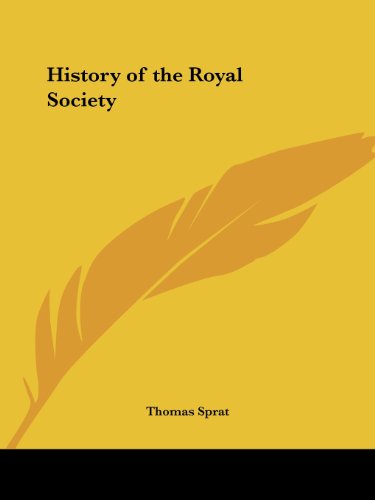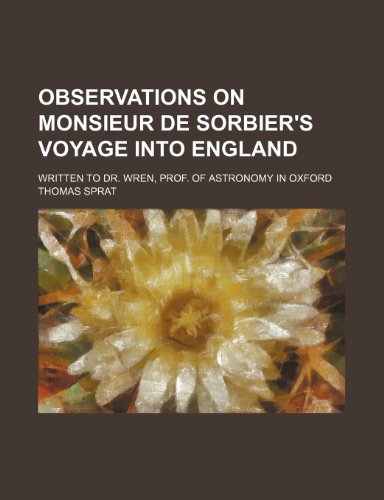Background
Sprat was born in 1635 at Beaminster, England. He was one of several children born to Thomas Sprat, a poor parish curate who held B. A. and M. A. degrees from Oxford, and his wife, who was the daughter of a Mr. Strode of Parnham, Dorset.



(This scarce antiquarian book is a facsimile reprint of th...)
This scarce antiquarian book is a facsimile reprint of the original. Due to its age, it may contain imperfections such as marks, notations, marginalia and flawed pages. Because we believe this work is culturally important, we have made it available as part of our commitment for protecting, preserving, and promoting the world's literature in affordable, high quality, modern editions that are true to the original work.
http://www.amazon.com/gp/product/0766128679/?tag=2022091-20

(This historic book may have numerous typos and missing te...)
This historic book may have numerous typos and missing text. Purchasers can download a free scanned copy of the original book (without typos) from the publisher. Not indexed. Not illustrated.1665 Excerpt: ... definition weh he himself has laid down of Learned men in general; For he iays,that it pt the good cuftome of such men, to render themselves ridiculous by their malignity,and their Billings-gate-language. In conformity to this deseription,besides what is already past, let us now behold what he reports of Dr« Walk, Dr. WMi, UxMohhs,, the Royal Society, the English Stage,their Eloquence, their Languagtflnd their Authors.. Dr. Walln he condemns for hU illufagt of Mr. Hobhs in the Mathematical Contrc versm that have fafl d between than. I will not endeavour to make any defence for this kpowing and.acute Profefior, as he grants. fyim rabe. But yet let me-fay, that if Monsieur deSor-biere himself being the Judg,-so much mddesty of language ought to be preserve!, even, in the contentions of Wifaiid Argument, when Passion is apt to overbear ithe most i temperate Minds; then certainly he himself ought to have teea careful careful of keeping to thesame rule, in an Mskrica Relation, wherein he hajino adversary to put him into, a heat, and nothing bus hi own natural peevishness JO exasperate his Anger. Wallis Entertain d him at his house, made him partake os his Experiment upon a dwnh Man, and behold the Model of a flat Floor, which (be fays) did raise admiration n Mr. Hohhs 9'5.94 himself And for all this, he might have deserv'd ac least, to have been pass'd by in silence, 8ut H had a good subject: to be merry with, for want of Polish Mufick.) and he must needs give the receipt of making p. ioo. n University Cap. Take« Portefueille: cover it with blrickCktb: fix a tuft of Silk, tipon it: and few it to a Calot; and you have a perfeft sous' corner'd Scholafiical Bonnet i Do you not now wonder Sir, why he did not call himself Taylor, as well as Trumpeter., to t...
http://www.amazon.com/gp/product/1235811298/?tag=2022091-20
Sprat was born in 1635 at Beaminster, England. He was one of several children born to Thomas Sprat, a poor parish curate who held B. A. and M. A. degrees from Oxford, and his wife, who was the daughter of a Mr. Strode of Parnham, Dorset.
Sprat entered Wadham College, Oxford, in November 1651, receiving the B. A. in June 1654 and an M. A. three years later.
Sprat became the favorite and protégé of John Wilkins and formed close associations with other members of the scientific group that gathered around Wilkins during those years, especially with Christopher Wren, Seth Ward, and Ralph Bathurst. He wrote a poem, “To the Happy Memory of the Late Lord Protector, ” dedicated to Wilkins for “having been as it were moulded by your own hands, and formed under your government, ” and charged with devoted admiration for Cromwell as the great savior who had led his people into the promised land. Sprat’s loyalties were always pliable, a fact often noted by his contemporaries, for he later served Charles II, James II, and William and Mary with the same devotion he had expressed for Cromwell.
Although he was a prominent figure in his time, Sprat’s fame today rests entirely on his History of the Royal Society, first published in 1667. The material that went into it was carefully supervised and selected, and its omissions and suppressions are as significant as its contents. It is not an impartial document; and it gave such strong impetus to renewed controversy that it may be doubted whether the Royal Society would not, at least in England, have been better off without this premature piece of justification. Part one presents a survey of ancient, medieval, and Renaissance philosophy that is meant to show “what is to be expected from these new undertakers, and what moved them to enter upon a way of inquiry different from that on which the former have proceeded. ” Here, and often in the rest of the work, Sprat’s strong words are reserved for “downright enthusiasts” and the “modern dogmatists, ” whom he compares to the recent “pretenders to public liberty, ” who became the greatest tyrants themselves. This political theme recurs forcefully throughout the work - for instance, in a later passage eulogizing Charles I as the royal martyr who followed the “divine example of our Saviour. ” Part two contains the history proper and is chronologically divided into three sections.
Sprat was the close friend and literary executor of Cowley, and his An Account of the Life and Writings of Mr. Abraham Cowley (1668) was the first biography of a writer attempting to show the interrelation between the poet’s life and personality and his works. Although he referred to the charm and interest of Cowley’s letters, he considered it an impropriety to publish them and presumably destroyed them.
(This Elibron Classics book is a facsimile reprint of a 17...)
(This scarce antiquarian book is a facsimile reprint of th...)
(This historic book may have numerous typos and missing te...)
In politics Sprat became a staunch Tory, a defender of the divine rights of kings, and a strong exponent of high church doctrines.
Fellow of the Royal Society (1663)
Sprat married Helen, the daughter of Devereux Wolseley of Ravenstone, Staffordshire and was the father of Thomas Sprat, Archdeacon of Rochester and Fellow of the Royal Society. Sprat was survived by his wife, who died in February 1726.
He was Archdeacon of Rochester and Fellow of the Royal Society.
Bishop of Rochester
